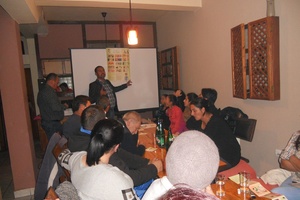With end to Global Fund support in Bosnia and Herzegovina, services targeting Roma minorities at risk of closure
Fate of seven outreach centers catering to the needs of the marginalized community unknown
With the end of eligibility for Bosnia and Herzegovina for Global Fund support, World Vision is drawing-down its long-running outreach program that worked to promote a better understanding of TB and HIV among the country's marginalized Roma populations.
From humble beginnings in 1999, the program has expanded to now
include seven centers, staffed by trained Roma outreach
counselors, who provide information about HIV and TB to
communities that exist on the margins of society. Outreach
programs include house visits and regular public meetings during
which community members share experiences and receive updated
information. Counseling, referrals, and transportation support
to testing points is also available at the outreach centers,
which are located in areas with high concentrations of Roma
communities. The program has trained 41Roma outreach workers who
serve 50 communities in BiH.
World Vision, current
sub-recipient of the grant now administered by the UN
Development Program (UNDP), has tried since 2012 to encourage
the BiH government to take over financial responsibility for the
program but has thus far been unsuccessful.
“World
Vision is doing everything we can to sustain this unique program
bringing healthcare services closer to Roma minorities," Slavica
Bradvic Hanusic, health lead of World Vision in BiH, told
Aidspan. "We have already requested that the PR apply for a
no-cost extension [to the Global Fund grant]. Meanwhile, we are
awaiting donor responses on the proposals we have already
developed and submitted. Together with local government, we are
actively involved in developing national HIV and TB transition
plans led by UNDP.”
Roma communities are a
visible marginalized minority in BiH. While there are no exact
figures on the number of Roma in the country -- their highly
mobile status makes it difficult to count them during national
census surveys -- unofficial estimates suggest a community size
of around 40-50,000 people.
The vast majority of the
population is unemployed and living in precarious condition in
informal settlements, without access to running water, sewerage
or electricity. Their access to health services is curtailed due
to their unregistered status and ineligibility for insurance
programs. Illiteracy is high, which adds to the stigma and
social isolation confronted by most Roma. These socio-economic
hardships are major contributors to the population's burden of
disease. HIV and TB infection rates are much higher than the
national average, according to World Vision.
Over
2014, four TB centers serving Roma population and polyvalent
patronage nurses referred 344 new patients to DOTS treatment.
But according to Slavica Bradvic Hanusic, because of the
discrimination most Roma face in BiH, it is not clear whether
all of those new patients are members of the Roma community. "We
can only assume based on their living conditions that TB rate
within Roma communities might be higher," she said.
As
an upper-middle-income country with a low HIV prevalence rate in
both the general and high-risk populations, BiH was declared
ineligible for Global Fund support under the new funding model
(NFM). There are two Round 9 grants -- one for TB and the other
for HIV -- that are set to close in 2015. UNDP is currently
negotiating a no-cost extension of the TB grant to continue
operations through 2016 while the hunt for additional funds
continues.
Source:
Aidspan


